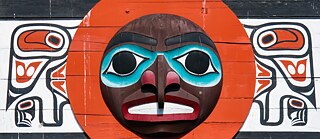Reconciliation in Canada and Germany
Reconciling with the Past

“Because of our history, I can never feel proud to be German.”
My schoolmate’s statement surprised me because I never heard anyone say anything like that back home in Canada.
By Waubgeshig Rice
But I understood what she meant, because the whole world has long been aware of the shameful history she was talking about. Back then, everyone knew about the brutal Hitler regime. But in my homeland, hardly anyone outside of Indigenous people knew of Canada’s violent and atrocious history.
erasing culture and identity
We were sitting in a coffee shop near Gymnasium Brake in the fall of 1996. It’s where I attended school as an exchange student through Rotary International. I had been in Germany for about five months by then, and was proficient enough in German to have a conversation with two friends about our countries’ histories.I explained to them the Canadian Indian Residential School system that stole and brutalized Indigenous children for more than a century. The government wanted to erase culture and identity, and largely succeeded, causing death and a tragic legacy of trauma and abuse. Although our discussion lasted only as long as our 15-minute coffee break between classes, it was a more comprehensive discussion about Canada’s genocidal history than I’d had with any white peers back home at that point in my life.
I understood then that Germany and Canada were two different countries with two very different approaches to acknowledging their shameful histories. While Germany appeared to be interested in education about the atrocities of the past, Canada seemed to be more interested in keeping the inner (and outer) peace at a terrible cost.
a shared goal of a positive future
Nearly a quarter-century later, though, Canada has made steps to recognize its crimes against Indigenous peoples. In 2008, the federal government finally apologized to survivors of the residential school system for taking them from their families and communities and subjecting them to violence. The Truth and Reconciliation Commission followed soon after, travelling the country to collect the stories of survivors to uncover the truth of Canada’s deplorable actions and ensure they wouldn’t happen again.And now, “reconciliation” is a word that’s spoken every day in communities across Canada. In the five years since the Truth and Reconciliation Commission issued its final report and calls to action, reconciliation has come to represent different things to different people. To some, it means a shared goal of a positive future. To others, it means returning Indigenous lands to their rightful stewards in the true spirit of the word. And to others still, it’s been discussed so often, with seeming little action, that it doesn’t mean anything at all.
And that’s where art comes in. Here we have a stunning collection of interpretations of reconciliation and reparation from both Germany and Canada. The voices and experiences are vibrant and diverse. Understanding these poignant perspectives is crucial in continuing these discussions for future generations.